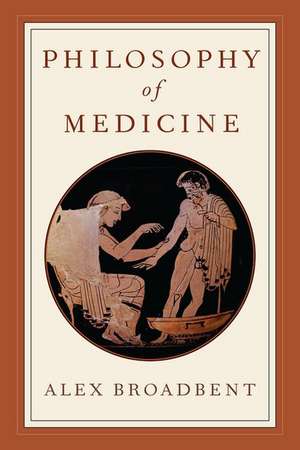Philosophy of Medicine
Autor Alex Broadbenten Limba Engleză Hardback – 14 mar 2019
| Toate formatele și edițiile | Preț | Express |
|---|---|---|
| Paperback (1) | 141.33 lei 31-37 zile | |
| Oxford University Press – 7 mar 2019 | 141.33 lei 31-37 zile | |
| Hardback (1) | 585.43 lei 31-37 zile | |
| Oxford University Press – 14 mar 2019 | 585.43 lei 31-37 zile |
Preț: 585.43 lei
Preț vechi: 781.49 lei
-25% Nou
Puncte Express: 878
Preț estimativ în valută:
112.04€ • 115.98$ • 94.70£
112.04€ • 115.98$ • 94.70£
Carte tipărită la comandă
Livrare economică 22-28 februarie
Preluare comenzi: 021 569.72.76
Specificații
ISBN-13: 9780190612139
ISBN-10: 0190612134
Pagini: 296
Dimensiuni: 213 x 145 x 23 mm
Greutate: 0.45 kg
Editura: Oxford University Press
Colecția OUP USA
Locul publicării:New York, United States
ISBN-10: 0190612134
Pagini: 296
Dimensiuni: 213 x 145 x 23 mm
Greutate: 0.45 kg
Editura: Oxford University Press
Colecția OUP USA
Locul publicării:New York, United States
Recenzii
A fascinating and compelling discussion that brings to light an exciting area in the philosophy of science. As such, the book is an excellent starting point for anyone wishing to explore the rapidly growing literature on this remarkable subject.
An important issue discussed [in this book] is attitudes towards patients with incurable diseases. The book has a large reference list...Recommended for physicians, psychologists and social workers.
This well-written book is a contribution to the burgeoning literature in philosophy of medicine--it offers interesting and compelling theories about various aspects of medicine, including its aims, shortcomings, research methods, and colonial heritage.
Alex Broadbent's Philosophy of Medicine addresses important topics that have been largely eclipsed by debates on bioethics and the nature of health and disease. In particular, Broadbent focuses on the core issues of what medicine is essentially and how to make medical decisions. His book makes significant contributions to the field not only by addressing neglected topics with historical and cultural sensitivity, but also through some ground-breaking claims, for instance that the business of medicine is not to cure.
The first thing to love about this book is what you can learn from it: what medicine can do even if it can't cure much, what evidence-based medicine may have achieved and what it may not have, the role of common law and the importance of cosmopolitanism, the dangers of epistemic medical relativism, a value-free definition of 'health' and much more. The second is that it practices what it preaches. The epistemic humility and practice-centered cosmopolitanism that Broadbent advocates for medicine characterize his own arguments and explanations. The book is thoughtful, humane, informed, a serious study, both philosophically and practically.
An important issue discussed [in this book] is attitudes towards patients with incurable diseases. The book has a large reference list...Recommended for physicians, psychologists and social workers.
This well-written book is a contribution to the burgeoning literature in philosophy of medicine--it offers interesting and compelling theories about various aspects of medicine, including its aims, shortcomings, research methods, and colonial heritage.
Alex Broadbent's Philosophy of Medicine addresses important topics that have been largely eclipsed by debates on bioethics and the nature of health and disease. In particular, Broadbent focuses on the core issues of what medicine is essentially and how to make medical decisions. His book makes significant contributions to the field not only by addressing neglected topics with historical and cultural sensitivity, but also through some ground-breaking claims, for instance that the business of medicine is not to cure.
The first thing to love about this book is what you can learn from it: what medicine can do even if it can't cure much, what evidence-based medicine may have achieved and what it may not have, the role of common law and the importance of cosmopolitanism, the dangers of epistemic medical relativism, a value-free definition of 'health' and much more. The second is that it practices what it preaches. The epistemic humility and practice-centered cosmopolitanism that Broadbent advocates for medicine characterize his own arguments and explanations. The book is thoughtful, humane, informed, a serious study, both philosophically and practically.
Notă biografică
Alex Broadbent is Professor of Philosophy, Executive Dean of Humanities, and founding Director of the African Centre for Epistemology and Philosophy of Science at the University of Johannesburg. He has interests in philosophy of science, medicine, epidemiology, and law. This is his third book.
